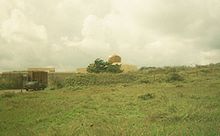Inayat Khan | |
|---|---|
عنایت خان رحمت خان | |
 | |
| Title |
|
| Personal | |
| Born | Inayat Khan Rehmat Khan July 5, 1882 |
| Died | February 5, 1927 (aged 44) New Delhi, British India |
| Religion | Islam |
| Spouse | Pirani Ameena Begum |
| Children | Vilayat; Hidayat; Noor; Khair-un-Nisa Inayat Khan |
| Denomination | Sunni |
| Jurisprudence | Hanafi |
| Creed | Sufism |
| Profession | Musician, Pir, Musicologist |
| Muslim leader | |
| Successor | Vilayat |
| Profession | Musician, Pir, Musicologist |
 Universel Murad Hassil, Netherlands | |
| Sant and Pir | |
| Venerated in | Inayatiyya; Western Sufism |
| Major shrine | Dargah in Hazrat Nizamuddin, Delhi |
| Influences | Sayyid Abu Hashim Madani |
| Influenced | Universal Sufism |
Tradition or genre | Chishti, and other major Sufi tariqa |
| Part of a series on |
| Western Sufism |
|---|
 |
|
Category:Western Sufism |
Inayat Khan Rehmat Khan (Urdu: عنایت خان رحمت خان; 5 July 1882 – 5 February 1927) was an Indian professor of musicology, singer, exponent of the saraswati vina, poet, philosopher, and pioneer of the transmission of Sufism to the West.[2] At the urging of his students, and on the basis of his ancestral Sufi tradition and four-fold training and authorization at the hands of Sayyid Abu Hashim Madani (d. 1907) of Hyderabad, he established an order of Sufism (the Sufi Order) in London in 1914. By the time of his death in 1927, centers had been established throughout Europe and North America, and multiple volumes of his teachings had been published.[3]
- ^ Pirzade Zia Inayat Khan, ed. (2001). A Pearl in Wine: Essays on the life, music and Sufism of Hazrat Inayat Khan. New Lebanon, NY; USA: Omega Publications. ISBN 093087269X.
- ^ Mehta, R.C (2001). "Music in the Life of Hazrat Inayat Khan". In Pirzade Zia Inayat Khan (ed.). A Pearl in Wine: Essays on the life, music and Sufism of Hazrat Inayat Khan. New Lebanon, NY; USA: Omega Publications. pp. 161–176. ISBN 093087269X.
- ^ Graham, Donald A. (2001). "The Career of Pir-o-Murshid Inayat Khan in the West". In Pirzade Zia Inayat Khan (ed.). A Pearl in Wine. New Lebanon, NY; USA: Omega. pp. 127–160. ISBN 093087269X.